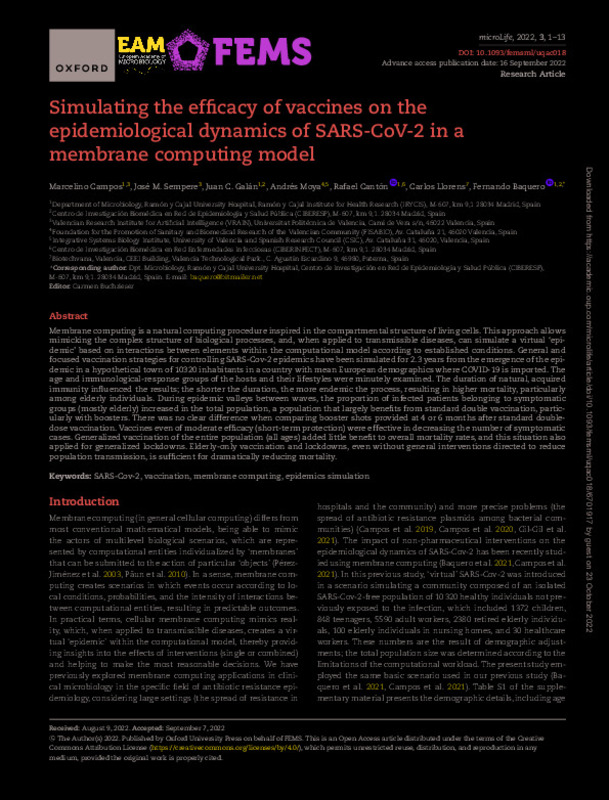JavaScript is disabled for your browser. Some features of this site may not work without it.
Buscar en RiuNet
Listar
Mi cuenta
Estadísticas
Ayuda RiuNet
Admin. UPV
Simulating the efficacy of vaccines on the epidemiological dynamics of SARS-CoV-2 in a membrane computing model
Mostrar el registro sencillo del ítem
Ficheros en el ítem
| dc.contributor.author | Campos Frances, Marcelino
|
es_ES |
| dc.contributor.author | Sempere Luna, José María
|
es_ES |
| dc.contributor.author | Galán, Juan C.
|
es_ES |
| dc.contributor.author | Moya, Andrés
|
es_ES |
| dc.contributor.author | Cantón, Rafael
|
es_ES |
| dc.contributor.author | Llorens, Carlos
|
es_ES |
| dc.contributor.author | Baquero, Fernando
|
es_ES |
| dc.date.accessioned | 2023-09-12T18:04:26Z | |
| dc.date.available | 2023-09-12T18:04:26Z | |
| dc.date.issued | 2022-09-16 | es_ES |
| dc.identifier.uri | http://hdl.handle.net/10251/196276 | |
| dc.description | This is a pre-copyedited, author-produced version of an article accepted for publication in [insert journal title] following peer review. The version of record [insert complete citation information here] is available online at: xxxxxxx [insert URL and DOI of the article on the OUP website]. | es_ES |
| dc.description.abstract | [EN] Membrane computing is a natural computing procedure inspired in the compartmental structure of living cells. This approach allows mimicking the complex structure of biological processes, and, when applied to transmissible diseases, can simulate a virtual `epidemic¿ based on interactions between elements within the computational model according to established conditions. General and focused vaccination strategies for controlling SARS-Cov-2 epidemics have been simulated for 2.3 years fromthe emergence of the epidemic in a hypothetical town of 10320 inhabitants in a country with mean European demographics where COVID-19 is imported. The age and immunological-response groups of the hosts and their lifestyles were minutely examined. The duration of natural, acquired immunity influenced the results; the shorter the duration, the more endemic the process, resulting in higher mortality, particularly among elderly individuals. During epidemic valleys between waves, the proportion of infected patients belonging to symptomatic groups (mostly elderly) increased in the total population, a population that largely benefits from standard double vaccination, particularly with boosters. There was no clear difference when comparing booster shots provided at 4 or 6 months after standard doubledose vaccination. Vaccines even of moderate efficacy (short-term protection) were effective in decreasing the number of symptomatic cases. Generalized vaccination of the entire population (all ages) added little benefit to overall mortality rates, and this situation also applied for generalized lockdowns. Elderly-only vaccination and lockdowns, even without general interventions directed to reduce population transmission, is sufficient for dramatically reducing mortality. | es_ES |
| dc.description.sponsorship | This work was partially fund by the Fundación del Conocimiento Madri+d from the Madrid' Autonomous Community through a research contract (AVATAR-EPAMEC) within the Health Start Plus Program, promoted by the Carlos III Health Research Institute (ITEMAS), Ministry of Science, Innovation and Universities of Spain. | es_ES |
| dc.language | Inglés | es_ES |
| dc.publisher | Oxford University Press | es_ES |
| dc.relation.ispartof | microLife | es_ES |
| dc.rights | Reconocimiento (by) | es_ES |
| dc.subject | Membrane computing | es_ES |
| dc.subject | Systems biology | es_ES |
| dc.subject | Epidemics simulation | es_ES |
| dc.subject | SARS-CoV-2 | es_ES |
| dc.subject | Vaccination | es_ES |
| dc.subject.classification | LENGUAJES Y SISTEMAS INFORMATICOS | es_ES |
| dc.title | Simulating the efficacy of vaccines on the epidemiological dynamics of SARS-CoV-2 in a membrane computing model | es_ES |
| dc.type | Artículo | es_ES |
| dc.identifier.doi | 10.1093/femsml/uqac018 | es_ES |
| dc.relation.projectID | info:eu-repo/grantAgreement/CAM//AVATAR-EPAMEC/ | es_ES |
| dc.rights.accessRights | Abierto | es_ES |
| dc.contributor.affiliation | Universitat Politècnica de València. Escola Tècnica Superior d'Enginyeria Informàtica | es_ES |
| dc.description.bibliographicCitation | Campos Frances, M.; Sempere Luna, JM.; Galán, JC.; Moya, A.; Cantón, R.; Llorens, C.; Baquero, F. (2022). Simulating the efficacy of vaccines on the epidemiological dynamics of SARS-CoV-2 in a membrane computing model. microLife. 3:1-13. https://doi.org/10.1093/femsml/uqac018 | es_ES |
| dc.description.accrualMethod | S | es_ES |
| dc.relation.publisherversion | https://doi.org/10.1093/femsml/uqac018 | es_ES |
| dc.description.upvformatpinicio | 1 | es_ES |
| dc.description.upvformatpfin | 13 | es_ES |
| dc.type.version | info:eu-repo/semantics/publishedVersion | es_ES |
| dc.description.volume | 3 | es_ES |
| dc.identifier.eissn | 2633-6693 | es_ES |
| dc.relation.pasarela | S\474833 | es_ES |
| dc.contributor.funder | Comunidad de Madrid | es_ES |
| dc.contributor.funder | Instituto de Salud Carlos III | es_ES |
| dc.contributor.funder | Ministerio de Ciencia, Innovación y Universidades | es_ES |
| dc.subject.ods | 03.- Garantizar una vida saludable y promover el bienestar para todos y todas en todas las edades | es_ES |








